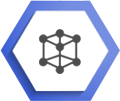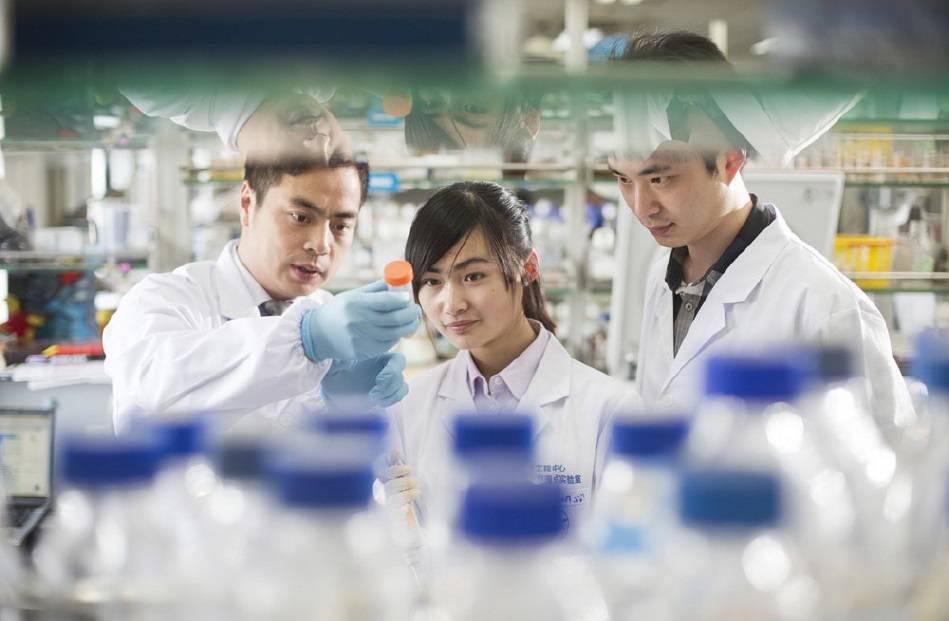Integrative Biomedical Sciences 1
In Integrative Biomedical Sciences 1 (IBMS1) you will develop a foundational core biological knowledge in the context of a biomedical background. The course will provide a broad introduction to all aspects of the application of biomedical informatics to biomedical sciences.
In Semester 1 you will critically explore foundational concepts in biology like cell theory, evolution, and the genetic basis of life. In Semester 2 you will explore key physiological systems (nervous, endocrine, gastrointestinal, immune, cardiovascular and pulmonary). Throughout the course you will develop your communication, laboratory and group-work skills. You will also develop foundational skills in experimental design and statistical analyses, and explore issues in bioethics.
A major focus is the development of the skills required to support your learning, particularly the use of scientific language and communication skills. The course emphasises formative assessment and provides numerous feedback opportunities to help you manage the transitions experienced by students entering higher education.
Introduction to Molecular and Cellular Biology 1
Introduction to Cellular and Molecular Biology 1 (ICMB1) will introduce you to fundamental concepts in cellular and molecular biology. You will have encountered some of these concepts in your previous study, for instance in IBMS1, but this course is an opportunity to take a closer look and go into more depth. We will start by looking at proteins, then spend a few weeks looking at how cells are structured and how they work, and finally learn about genes and DNA. Practicals are designed to reinforce the content of the lecture and give you an opportunity to acquire and practise fundamental molecular biology laboratory skills. This includes both wet lab skills and the use of high school homework help landing specialized computer programmes. You will also improve your skills related to the practice of science, including experimental design, generating, documenting and reporting data, working in groups, reading and critically evaluating information, presenting and discussing data and ideas.
Introduction to Biomedical Informatics 1
Introduction to Biomedical Informatics 1 aims to provide students with an overview of the fundamental technological concepts of Biomedical Informatics using real-world applications as examples. The course will lay a strong technical and computational foundation in the areas of operating systems, version control, and programming. Those skills will be taught with a view towards biomedical applications and examples, wherever possible, drawn from the biomedical field. The course will also introduce various technological sub-fields of Biomedical Informatics, including genomics, working with online medical resources, public health informatics, simulation and modelling, and artificial intelligence. This is intended to give students a broad overview of the field and what it entails, with an opportuntity to go into more depth in future years.
Mathematics and Statistics
This module covers the fundamental mathematics and statistics for bioinformatics, including calculus, linear algebra and statistics. The statistics part focuses on descriptive statistics and parameter estimation, hypothesis testing, curve fitting and variance analysis. Examples of real world biomedical data analysis will be used in teaching.
Chemistry Experiment
Chemical experiment is designed to provide students a valuable opportunity and space to practice. The teaching purpose is to enable students to get more chemical knowledge and understand that chemistry has been widely infiltrated into life science, materials science, environmental science, energy science and many other fields. Meanwhile, we focus on training realistic science attitude and innovation ability, so that students can receive comprehensive education of chemistry.
Integrated Functions of Body Systems 2
The overarching aim of Integrated Functions of Body Systems 2 (IFBS2) is to provide a sound understanding of physiology using different aspects of homeostasis to demonstrate how more than one body system is responsible for maintaining normal health. Rather than study each of the body systems in isolation, a body system will be introduced in the context of its role in the regulation and maintenance of an aspect of homeostasis. The reasoning for this approach is to demonstrate how the functions of different homework for me body systems are integrated. Some physiological processes will be studied in detail; that is, from the molecular and cellular level through to the whole body. For each body system you will learn both the gross and fine (histology) anatomy. As a tool to understanding the physiology in a healthy individual, some examples of pathology and pharmacology will be used. The general principles of both pathology and pharmacology will be covered in Applied Biomedical Sciences 2 (ABMS2).
Biomedical Genetics 2
Biomedical Genetics II aims to investigate the basis of modern human molecular genetics. The course focuses on the development of knowledge and understanding of the organisation of the human genome, and the regulation and function of gene expression. Concepts will be introduced in lectures through evaluation of experimental approaches and genomic technologies used in the analysis of the structure and expression of genes, including in model organisms. Approaches for identifying causative genes underlying human disease and characterisation of their functions, and the potential for genetic treatment of disease will be addressed.
Database and Software Technology
This module teaches students well-established database and software technologies that are widely-used in biomedical informatics. Students will learn Java programming with an emphasis on the wisdom of object-oriented programming and advanced data structure, based on which students will learn requirement analysis, acquire the knowledge about software engineering, and grasp the coding of complex analysis tool. Besides, students will also study the technologies for construction, management and maintenance of a biological database, including the theories on relational database model, SQL language and transaction management.
Genomics and Proteomics
Genomics and proteomics data are accumlating at an exponential rate, significantly accelerating biomedical research and playing a key role in elucidating the mechanisms of life, and diagosing and treating complex and refractory diseases. This course will cover the theories and applications of genomics and proteomics, including its experimental technologies, data formats and standards, procedures for collecting, cleaning and managing data, verification strategies, quantification approaches and functional analysis tools. It builds on students' technological foundations gained in Introduction to Biomedical Informatics 1 and Database and Software Technology 2, as well as biomedical core knowledge from Introduction to Cellular and Molecular Biology 1 and Biomedical Genetics 2. Students will have hands-on experience in analyses of real genomics and proteomics data originating from scientific research.
Applied Data Science 2
This course runs alongside and compliments the other 2 courses and introduces students to data science and statistics in a biological context. By taking data sets generated in other courses or otherwise related to their content, students will develop a sense of the challenges and opportunities of working with biological data. They will learn skills related to data processing, cleaning and documentation, as well as a variety of statistical analysis methods. The main focus will be on classical statistics, but students will also get a flavour of Bayesian statistics and machine learning. At the end of this course, we want students to be able to choose an appropriate method of analysis when faced with an unfamiliar dataset.
Integrated Biomedical Sciences 3
The overarching aim of Integrated Functions of Body Systems 2 (IFBS2) is to provide a sound understanding of physiology using different aspects of homeostasis to demonstrate how more than one body system is responsible for maintaining normal health. Rather than study each of the body systems in isolation, a body system will be introduced in the context of its role in the regulation and maintenance of an aspect of homeostasis. The reasoning for this approach is to demonstrate how the functions of different homework for me body systems are integrated. Some physiological processes will be studied in detail; that is, from the molecular and cellular level through to the whole body. For each body system you will learn both the gross and fine (histology) anatomy. As a tool to understanding the physiology in a healthy individual, some examples of pathology and pharmacology will be used. The general principles of both pathology and pharmacology will be covered in Applied Biomedical Sciences 2 (ABMS2).
Biomedical Informatics 3
Biomedical Genetics II aims to investigate the basis of modern human molecular genetics. The course focuses on the development of knowledge and understanding of the organisation of the human genome, and the regulation and function of gene expression. Concepts will be introduced in lectures through evaluation of experimental approaches and genomic technologies used in the analysis of the structure and expression of genes, including in model organisms. Approaches for identifying causative genes underlying human disease and characterisation of their functions, and the potential for genetic treatment of disease will be addressed.
Computational Biology and Systems Biology 3
This module teaches students well-established database and software technologies that are widely-used in biomedical informatics. Students will learn Java programming with an emphasis on the wisdom of object-oriented programming and advanced data structure, based on which students will learn requirement analysis, acquire the knowledge about software engineering, and grasp the coding of complex analysis tool. Besides, students will also study the technologies for construction, management and maintenance of a biological database, including the theories on relational database model, SQL language and transaction management.
Two elective courses from the following
Principles of Neuroscience 3
Principles of Neuroscience 3 is a Semester 1 elective course that aims to develop comprehensive understanding of neuroscience, its modern research questions and techniques across the range of disciplines including molecular, cellular, systems, cognitive, behavioural and computational neuroscience. The topics include neurons and their circuits, neurotransmitters, glial cells, structural and synaptic plasticity, sensory and motor systems, neural codes, chemical control of the brain and behaviour, emotion and consciousness, language, attention, learning and memory, emotion and motivation, social neuroscience and neuroeconomics, reinforcement learning, interactions between brain systems, neural development, injury and repair, and various neurological disorders. We will review a variety of modern neuroscience techniques used to study each system (e.g. behavioural, optogenetics, neuroimaging, computational modelling, and brain computer interface) and learn how to tackle the complexity of data and integration of techniques at different levels that is commonplace in modern neuroscience research.
Molecular Biology and Epigenetics 3
Molecular Biology and Epigenetics 3 course (MBE3) will provide a comprehensive coverage of genetic and epigenetics processes that regulate human gene expression, with a focus on human molecular biology and disorders. This course will focus on delivering material to develop advanced knowledge of molecular biology and epigenetic subject matter required for honours electives in Year 4.
Endocrine and Reproductive Biology 3
Endocrine and Reproductive Biology 3 (ERB3) comprises an integrated series of lectures, practical classes, workshops and tutorials focused on major aspects of endocrinology and reproductive biology in human health and disease.
The aim of this elective is to develop knowledge in major aspects of endocrinology and reproductive biology in human health and disease. A particular focus of the course will be how the different endocrine systems interact and how hormones affect the actions of different systems throughout the body. The course will emphasise how basic biomedical research has led to key discoveries that have facilitated the development of therapies for endocrine diseases and disorders, such as diabetes mellitus, Cushing’s disease, Addison’s disease, polycystic ovarian syndrome and hypogonadism, as well as modern contraceptives.
Infection 3
Infection 3 (IN3) aims to develop an understanding of the molecular and cellular basis of infectious diseases, the mechanisms of host-pathogen interactions, the role of infectious agents and the host in disease pathogenesis, the role of immune responses and therapeutics in controlling infection, and the epidemiology and evolution of pathogenic microbes. The course will be taught via weekly lectures and tutorial sessions, as well as laboratory practicals.
Integrative Biomedical Sciences 4
The Integrative Biomedical Sciences 4 course is primarily aimed at developing the skills required for a successful postgraduate career in science and related industries. By this stage in the programme you should already be well-versed in the principles of experimental design. This course will build on these skills and extend them to design of programmes of research. Initially this will involve analysing the rationale behind programmes presented in research seminars before learning research proposal skills. You will also learn to identify skills that you have already developed and how to effectively communicate these abilities.
Finally, the course will teach the core principles of science communication and public engagement in preparation for a public engagement event for which you will prepare an activity to promote the science behind your Semester 2 research project.
Biomedical Informatics Project Preview
This summative in-course assignment involves writing a literature review and research proposal related to your semester 2 lab project.
This assignment forms 100% of the assessment for the Integrative Biomedical Sciences Research Project Preview course for your UoE degree.
Biomedical Informatics Research Project
The aim of this course is to give students the opportunity to conduct a piece of original research. The research project may be laboratory-based or library-based. The project results will be presented orally to staff and fellow students and as a written dissertation. Students will regularly reflect on their progress and experiences.
Biomedical Informatics Synoptic Assignment
Students are required to answer one question from five available questions during the exam. They are marked according to the following criteria: Evidence of highly refined, critical personal view and judgement in selecting, evaluating and integrating relevant material from within and outside that taught in the programme. Highly detailed knowledge drawn from many sources that directly addresses the question, and gives many relevant examples of scientific evidence, concepts, theories, and/or gaps in the knowledge. Clear evidence of extensive knowledge and creative and feasible application of the literature. Logically, thoughtfully and clearly written. The student’s answer is essentially ready for submission to a peer-reviewed scientific journal.
Two elective courses from the following
Cancer Biology 4
In the Cancer Biology module, you will develop an appreciation of the complex nature of cancer. This course will provide a broad introduction to all aspects of cancer biology.
You will study the genetic and cellular changes that transform normal cells into cancerous cells. Upon completion of this course, you should understand the mechanisms by which tumours gain and maintain a growth advantage, appreciate the basic research that leads to the latest concepts in cancer biology, and a general understanding on the various methods of detection and treatment of cancers. Reading, presenting and dissecting scientific articles in a group setting will be used to facilitate a deeper appreciation to the various aspects of cancer biology.
Cancer biology is a fast-moving field. A major focus of the course is on the development of reading skills required to critically asses research publications to enhance your own knowledge. The course emphasises on reading ground-breaking research publications and presenting published work in a tutorial setting. This is to help you gain experience in presenting scientific data in front of an audience.
Inflammation and Inflammatory Diseases 4
This course will give deeper understanding as to how inflammation can arise in response to processes including infection, tissue damage, and autoimmunity. You will evaluate the underlying inflammatory mechanisms in initiation, resolution and repair directed via immune responses in a variety of contexts. You will consider how chronic and non-resolving inflammation in a range of tissues, organs and body systems can lead to damage and disease, and how this can be tackled therapeutically.
The course is not a fundamental or comprehensive course in inflammation, but is instead a series of inflammation research vignettes and exercises used to encourage you to consolidate your understanding, and also expand your knowledge of inflammation in increasing detail including the most recent understanding in this field. The course will help hone your research skills and develop your own interests in the area of inflammation and inflammatory disease. The course will be taught via a series lectures and tutorials which will consider some of the latest advances and primary research data in the area of inflammation. Tutorials will focus on critical evaluation of primary scientific literature directly linked to lecture topics, with some featuring a ‘behind the paper’ discussion with the paper’s authors to dissect the reality of the experiments presented in the literature. Tutorials will also focus on building necessary scientific communication skills through abstract writing and graphical abstract preparation in addition to discussions with course staff in tutorials. There are no practicals.
Ion Channel Biology 4
The main topic of this course is the molecular processes occurring at, in or across the lipid bilayer, mediated by membrane proteins. The aim is to provide an understanding of the function, structure and organisation of the membranes proteins, with the main focus on ion channels. This course will cover concepts and research techniques in membrane proteins, with a special focus on the ion channels, while we will also mention the roles of transporters, pores and other medically important membrane proteins. These membrane proteins are key players in cognitive processes, such as learning and memory, and also for muscle function, including the heart, but are thought to have important roles in a wide array of diseases including cancer, and kidney and lung disorders. This course will also provide an overview of membrane protein biogenesis, interactions, dynamics and medical importance, as many of the proteins are involved in diseases and are due to their unique position- prominent drug targets.
Discussion and consolidation sessions provide opportunities to provide feedback on learning and skill development and all formats of assessed work. Written formative feedback will be provided as key academic skills are developed particularly in essay writing and presentational skills. Feedback will be given following the summative evaluation of in-course assessments.
Stem Cells and Regenerative Medicine 4
This course provides a detailed introduction to the biology of stem cells, including stem cell types and sources, self-renewal, differentiation and lineage commitment. More importantly, this course introduces the main aspects of regenerative medicine in depth, especially the novel strategies to regenerate cells, tissue or organs to restore normal function. There will be four major themes: principles of stem cell biology and regenerative medicine; the molecular mechanisms underlying stem cell development; experimental approaches in stem cell research which will be explored in the context of stem cell related disorders; the strategies used in regenerative medicine such as stem cell therapy and biomaterials seeded with stem cells.
The major goal of this course is to provide knowledge in stem cell biology, focusing on molecular processes driving stem cell development and organ regeneration. Regenerative medicine seeks to restore the function of damaged tissues in patients suffering severe injuries or chronic disease. The self-renewal capacity and multipotent differential potential of stem cells make them idea tools for regenerative medicine. Thus, stem cell applications in tissue repair and disease therapeutics will be the core theme of the course. Problem-orientated learning will be used to develop experimental design skills.
Biomedical Image Analysis 4
Biomedical Image Analysis 4 (BIA4) aims to give you the ability to apply and improve strategies and pipelines for biomedical image analysis. The course will provide you with the opportunity to understand and use an array of algorithms for image processing and analysis and prepare you to be able to develop ad hoc strategies for specific problems you might encounter in real-life situations. This course aims to equip you with skills that will apply to analysis of a wide range of types of biological images, from 2D and 3D photomicrographs, medical images such as MRI scans, as well as time-lapses, e.g. from calcium imaging or behavioural experiments. The course will expose you to common, yet often complex, problems in image analysis, and suggest tools and algorithms for solving them; these include, for instance, image segmentation, particles and object tracking, contour tracing, object labelling and classification, image registration in 2D and 3D. Python will be used throughout this course as it offers a vast array of open-source libraries dedicated to image analysis.
Brain, Cognition and Artificial Intelligence 4
Brain, Cognition and Artificial Intelligence 4 (BCAI4) covers topics in cognition and intelligence – natural and artificial. It discusses how human cognition originates from brain mechanisms and how its principles inspire and inform artificial intelligence (AI) approaches. The course discusses advances and methodologies of cognitive, computational neuroscience and artificial intelligence (including machine learning) in an integrated way. It is organized around 4 topics (learning, decision making, knowledge representations and social intelligence) which are addressed from both perspectives. We aim for students to develop a good understanding of each discipline, its basic techniques, similarities and differences between cognitive/computational neuroscience and AI, and how their advances can impact health and society, with a particular focus on ethical aspects.








